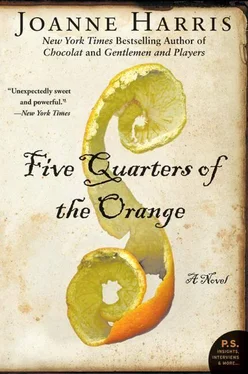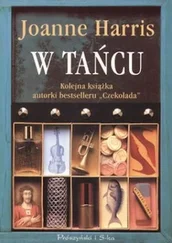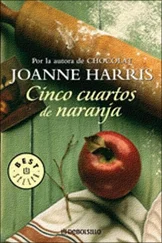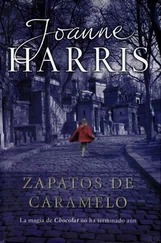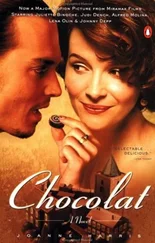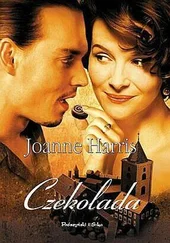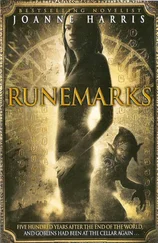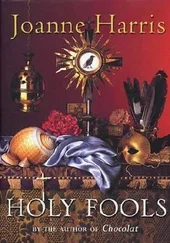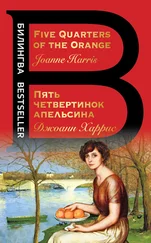Cassis was getting bored.
“Nothing’s happening,” he said in a sullen voice. “Let’s go.”
But Reinette and I were fascinated, she by the lights, the jewelry, the glassware, the smoke from an elegant lacquer cigarette holder held between painted nails, and I…Tomas, of course. It didn’t matter whether anything was happening. I would have derived equal pleasure from watching him alone and sleeping. There was a charm in watching him in secret like this. I could put my hands on the blurry glass and cup his face between them. I could put my lips to the window and imagine his skin against mine. The other three had been drinking more heavily, fat Schwartz with a woman on his knee, one hand riding her skirt higher and higher up her legs so that occasionally I was able to catch a glimpse of the top of her brown stocking and the pinkish garter that held it. I noticed too that Henri had moved closer to the group, ogling the women who screeched like peacocks at every pleasantry. The cardplayers had stopped their game to stare, and Jean-Marie, who seemed to have won the most, moved casually across the bar toward Tomas. Jean-Marie pushed money across the scuffed surface, and Raphaël brought more drinks. Tomas looked once, briefly, behind him at the group of drinkers and smiled. It was a short conversation, and it must have passed unnoticed by anyone who was not deliberately observing Tomas. I imagine that only I saw the transaction, a smile, a mutter, a paper pushed across the bar and quickly hidden in the pocket of Tomas’s coat. It didn’t surprise me. Tomas traded with everyone. He had that gift. We watched and waited for another hour. I think Cassis dozed. Tomas played the piano for a while as Agnès sang, but I was pleased to see that he showed little interest in the women who fawned over and caressed him. I felt proud of him for that. Tomas had better taste.
Everyone had drunk rather a lot at this stage. Raphaël produced a bottle of fine and they drank it neat in coffee cups but without the coffee. A card game started between Hauer and the Dupré brothers, with Philippe and Colette watching and drinks as stakes. I could hear their laughter through the glass as Hauer lost again, though there was no ill feeling, as the drinks were already paid for. One of the town women fell over onto her ankle and sat on the floor, giggling, hair falling over her face. Only Gustave Beauchamp remained aloof, refusing an offer of fine from Philippe and keeping as far from the Germans as possible. He caught Hauer’s eye once and said something under his breath, but as Hauer didn’t catch it, the German just looked at him coolly for a moment before returning to the game. It happened again though, a few minutes later, and this time Hauer, the only one of the group apart from Tomas who could really understand French, stood up, one hand going to the belt where he kept his pistol. The old man glowered at him, his pipe jutting out between his yellow teeth like the barrel of an old tank.
For a moment the tension between them was paralyzing. I saw Raphaël make a movement toward Tomas, who was watching the scene with unruffled amusement. A silent exchange passed between them. For a second or two I thought he might let it go on, just to see what might happen. The old man and the German faced each other, Hauer fully two heads taller than Gustave with his blue eyes bloodshot and the veins in his forehead like bloodworms against his brown skin. Tomas looked at Raphaël and smiled. What do you think? said the smile. Seems a pity to step in just when things are getting exciting. What do you think ? Then he stepped forward, almost casually, to his friend, while Raphaël maneuvered the old man out of harm’s way. I don’t know what he said, but I think Tomas saved old Gustave’s life then, one arm round Hauer’s shoulder and the other gesturing vaguely in the direction of the boxes they had brought with them on the back of the fourth motorcycle, the black boxes that had so intrigued Cassis and which now stood against the piano waiting to be opened.
Hauer glared at Tomas for a moment. I could see his eyes narrowed to cuts in his thick cheeks, like slices in a piece of bacon rind. Then Tomas said something else and he relaxed, laughing with a troll’s roar above the sudden renewal of sound in the taproom, and the moment was over. Gustave shuffled off into a corner to finish his drink, and everyone went over to the piano where the boxes were waiting.
For a while I could see nothing but bodies. Then I heard a sound, a musical note much clearer and sweeter than that of the piano, and when Hauer turned toward the window he was holding a trumpet. Schwartz had a drum. Heinemann an instrument I did not recognize. The women moved aside to allow Agnès to reach the piano, then Tomas moved back into my field of vision with his saxophone slung over one shoulder like an exotic weapon. For a second I thought it was a weapon. Beside me Reinette took in a long wavery breath of awe. Cassis, wide awake now and his boredom forgotten, leaned forward, almost pushing me out of the way. It was he who identified the instruments for us. We had no record player at home, but Cassis was old enough to remember the music we used to listen to on the radio, before such things were forbidden, and he’d seen pictures of Glenn Miller’s band in the magazines he loved so much.
“That’s a clarinet!” He sounded very young, suddenly very like his sister in her awe over the town women’s shoes. “And Tomas has got a saxophone-oh, where did they get them? They must have requisitioned them-trust Tomas to find…Oh, I hope they play them, I hope they…”
I don’t know how good they were. I had no point of comparison at all, and we were so flushed with the excitement and the wonder of it that anything would have charmed us. I know it seems ridiculous now, but in those days we heard music so seldom-the piano at La Mauvaise Réputation, the church organ for those who went to church, Denis Gaudin’s violin on July 14 or Mardi Gras, when we danced in the streets… Not so much of that after the war started, of course, but we still did for a while. But now the sounds-exotic, unfamiliar sounds as unlike La Mauvaise Réputation ’s old piano as opera from barking-arose from the taproom, and we drew closer to the window so as not to miss a note. At first the instruments did little but make odd wailing sounds-I imagine they were tuning up, but we didn’t know that-then they began to play some bright sharp-sounding tune that we did not recognize, though I think it might have been some kind of jazz. A light beat from the drum, a throaty burble from the clarinet, but from Tomas’s saxophone a string of bright notes like Christmas lights, sweetly wailing, harshly whispering, rising-falling above the half-discordant whole like a human voice magically enhanced and containing the entire human range of softness, brashness, coaxing and grief…
Of course, memory is such a subjective thing. Perhaps that’s why I feel tears in my eyes as I recall that music, music for the end of the world. In all probability it was nothing like what I remember-a group of drunken Germans hammering out a few bars of jazz blues on stolen instruments-but for me it was magic. It must have had some effect on the other patrons too, because in a few minutes they were dancing-some alone and others in pairs, the town women in the arms of the card-playing Dupré brothers and Philippe and Colette with their faces close together-a kind of dance we had never seen before, a kind of gyrating, bump-grinding dance where ankles went over and tables were shunted by rotating backsides and laughter shrilled over the sounds of the instruments and even Raphaël tapped his foot and forgot to look wooden. I don’t know how long it lasted. Maybe less than an hour. Maybe just a few minutes. I know we joined in, gleeful outside the window, jigging and gyrating like small demons. The music was hot , and the heat burnt off us like alcohol in a flambée , with a sharp, sour smell, and we whooped like Indians, knowing that with the volume of sound indoors we could make as much noise as we pleased and still remain unheard. Fortunately I was watching the window all the time, because I was the one to see old Gustave leave the place. I gave the alarm at once, and we dived behind the wall just in time to see him stumbling out into the freshening night, a stooped dark figure with the glowing bowl of his pipe making a red rose on his face. He was drunk, but not debilitated. In fact, I believe he had heard us, for he stopped alongside the wall and peered sharply into the shadows at the back of the building, one hand pressed against the angle of the porch to stop himself from falling.
Читать дальше
